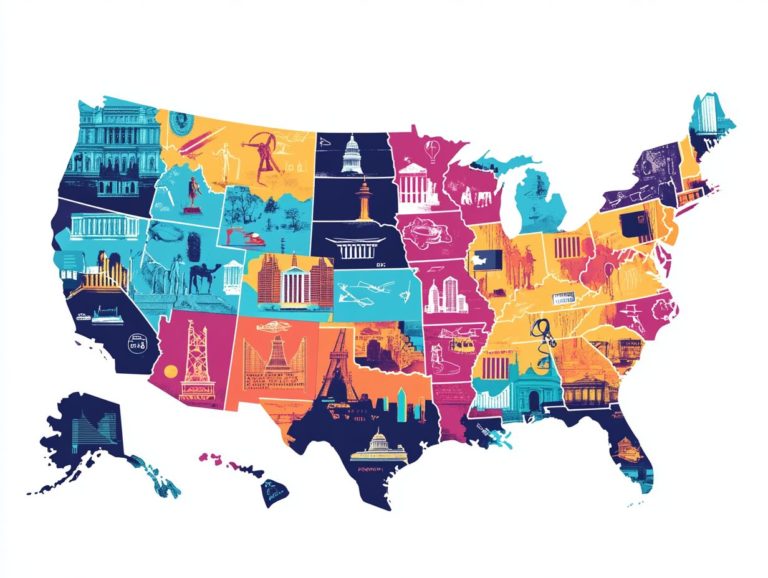How to Set Up Your Freelance Business for Tax Success
Freelancing offers you a world of flexibility and freedom, but it also brings unique tax responsibilities that can feel overwhelming. Understanding your tax obligations is essential for maintaining your financial health and ensuring peace of mind.
This article breaks down the key elements you need to grasp, from the types of taxes you should keep an eye on to effectively organizing your finances for tax season, including IRS regulations.
It delves into the advantages and disadvantages of various business structures, such as LLCs and S corporations. It also guides you through the intricacies of estimated taxes and highlights the value of collaborating with tax professionals like a CPA.
Furthermore, you ll discover practical tips to maximize your deductions and keep your finances in pristine order. Whether you re a seasoned freelancer or just starting this journey, this guide is designed to set you up for tax success.
Contents
- Key Takeaways:
- Understanding Tax Obligations for Freelancers
- Organizing Your Finances for Tax Season
- Choosing the Right Business Structure
- Paying Estimated Taxes as a Freelancer
- Working with an Accountant or Tax Professional
- Tax Tips for Freelancers
- Frequently Asked Questions
- 1. What is a freelance business and why is it important to set it up for tax success?
- 2. How do I register my freelance business for tax purposes?
- 3. What documents do I need to keep for tax purposes as a freelance business owner?
- 4. Are there any tax deductions I can claim as a freelance business owner?
- 5. Do I need to pay estimated taxes as a freelance business owner?
- 6. Should I hire an accountant or tax professional to help with my freelance business taxes?
Key Takeaways:

- Understand your tax obligations as a freelancer, including the types of taxes you need to pay.
- Organize your finances for tax season by tracking your income and expenses.
- Consider working with an accountant for guidance on maximizing deductions.
Understanding Tax Obligations for Freelancers
Freelancers encounter distinct tax obligations that can vary considerably from those of traditional employees. This highlights the importance of mastering the intricacies of freelance taxes.
As self-employed individuals, you must adeptly navigate IRS regulations, maintain precise records of your income and expenses, and accurately complete your tax returns, often using forms like Schedule C. Additionally, learning how to save for taxes as a freelancer can help you manage your finances more effectively.
Understanding the implications of your role as a freelancer is crucial for ensuring compliance and effective financial planning. These factors can significantly influence your business growth and overall financial stability.
Types of Taxes and Filing Requirements
As a freelancer, you need to navigate a complex landscape of taxes, including income tax and self-employment tax. These can complicate your filing requirements considerably.
Additionally, it’s essential to familiarize yourself with estimated taxes, quarterly payments designed to prevent penalties come year-end. Understanding these various obligations, including taxable income for freelancers, not only ensures compliance but also minimizes the risk of audits. Filing your taxes accurately supports sound financial practices and grants you much-needed peace of mind.
You’ll often use various IRS forms, like Schedule C for reporting income and Form 1040 for your individual income tax returns. Staying organized and informed throughout the year is essential for your success. Additionally, consider following 5 essential tax tips for creative freelancers to navigate your financial responsibilities effectively.
Organizing Your Finances for Tax Season
Organizing your finances effectively is essential as tax season looms. Ensuring that all your business expenses, income, and pertinent documentation are easily accessible will set you up for success.
By utilizing accounting software, you can streamline this process. This allows you to maintain accurate bookkeeping and a comprehensive summary of your expenses. This meticulous approach is vital for maximizing your tax deductions and fulfilling your tax obligations with confidence.
Tracking Income and Expenses
Tracking your income and expenses is crucial for your success! As a freelancer, it helps manage your cash flow and overall financial health.
By closely monitoring your financial transactions, you ll gain valuable insights into your earning patterns and pinpoint areas that could use some improvement.
Utilizing reliable tools, such as accounting software tailored for freelancers, can make this task considerably easier. Many of these platforms come equipped with features that automatically categorize expenses and generate insightful reports, saving you time and effort.
Keeping separate bank accounts for personal and business use can help you track your money better. Accurate income and expense management not only maximizes your tax deductions but also lays the groundwork for sound financial planning. For new freelancers, following tax planning tips ensures that you are well-prepared for future opportunities and challenges.
Utilizing Tax Deductions and Credits

Freelancers have the opportunity to significantly reduce their taxable income by skillfully leveraging tax deductions and credits associated with their business expenses.
These deductions cover a broad spectrum, including home office expenses, which enable you to write off a portion of your household bills, such as utilities and internet costs. It’s also important to explore travel-related deductions for business trips, encompassing airfare, lodging, and meals while you’re away from home. Maintaining meticulous records and receipts is essential to substantiate these claims.
By strategically planning your business travel and optimizing your home office layout, you can maximize your deductions, ultimately leading to substantial tax savings. Understanding the intricacies of these deductions gives you the power to make informed decisions, enhancing your overall financial well-being.
Choosing the Right Business Structure
Choosing the right business structure is a pivotal decision for freelancers, as it directly influences your tax obligations, liability, and operational flexibility. You have several options, including sole proprietorship, LLC (Limited Liability Company), or S corporation (a type of corporation that meets specific IRS requirements).
Each offers unique legal frameworks and implications for your taxation and personal asset protection. By understanding the advantages and disadvantages of each structure, you can make informed choices that resonate with your business objectives and financial landscape. Additionally, knowing how to handle tax audits as a freelancer can further enhance your financial insight.
Pros and Cons of Different Structures
Each business structure comes with its own unique set of advantages and disadvantages that can significantly impact freelancers, particularly in areas like tax implications, liability, and administrative duties.
For example, when you choose an LLC, you gain a protective barrier against personal liability, safeguarding your personal assets in the event of legal issues. The flexibility in tax treatment allowing you to be taxed as either a sole proprietorship or a corporation could lead to meaningful savings and provide opportunities for retirement plans. Conversely, if you opt for an S corporation, you might be able to sidestep self-employment taxes on dividends, which could be highly beneficial as your income grows.
However, it’s important to note that these structures often come with increased administrative responsibilities and specific compliance requirements, which could feel burdensome to some. The choice of business structure directly affects how you manage your financial responsibilities and risks as a freelancer. Additionally, knowing 5 ways to lower your tax liability as a freelancer can further help in managing your finances effectively.
Paying Estimated Taxes as a Freelancer
Paying estimated taxes is a fundamental obligation for freelancers like you, requiring quarterly payments to the IRS to avoid penalties and ensure compliance with tax regulations.
This proactive approach gives you the power to manage your tax responsibilities effectively, enabling you to plan and allocate your resources wisely throughout the year.
Calculating and Submitting Payments
Calculating and submitting estimated tax payments might seem daunting. However, with a clear understanding of the process and your tax filing requirements, you can navigate your obligations with confidence.
By breaking it down into manageable steps, you can prepare effectively for your tax responsibilities.
- First, determine your expected annual income, considering all sources of revenue.
- Next, use IRS Form 1040-ES to estimate your tax liability based on these income projections, while adjusting for any deductions or credits that apply to your situation.
- It s also wise to review your past tax returns as a helpful reference point.
Exploring resources such as online tax calculators or professional tax services can provide valuable guidance and ensure accuracy. This makes the entire process feel much less overwhelming, especially when using financial software.
Working with an Accountant or Tax Professional

Collaborating with an accountant or tax professional can greatly enhance your experience as a freelancer, especially when navigating freelance taxes. They offer valuable advice on tax planning and compliance, while also nurturing stronger financial relationships.
A skilled CPA or tax advisor can guide you effectively through the intricate maze of freelance taxes. They ensure you meet all tax obligations and don t miss out on potential credits and deductions.
This strategic support can significantly boost your business growth and financial well-being.
Benefits and Considerations
Hiring an accountant or tax professional brings a wealth of benefits for freelancers, from expert navigation of tax obligations to strategic financial planning.
By working with a knowledgeable expert in freelance taxes, you can develop tailored financial strategies that not only optimize your income but also minimize your tax liabilities. A tax professional ensures that you remain compliant with ever-evolving IRS regulations, helping you avoid potential pitfalls that could lead to audits or penalties.
As you contemplate the value of hiring such a specialist, consider the costs involved alongside the potential savings and benefits. Investing time to select the right professional, someone who understands the unique challenges you face as a self-employed individual, can significantly impact your journey toward long-term financial stability. Additionally, understanding how to estimate your taxes as a freelancer can also be a valuable asset in this process.
Tax Tips for Freelancers
Freelancers can benefit greatly by adopting effective tax strategies designed to maximize tax deductions and refine financial approaches. This ultimately enhances cash flow and optimizes tax benefits.
By embracing diligent bookkeeping practices and proactively engaging in tax filing and planning, self-employed individuals can reduce their tax liabilities and fully leverage available tax credits.
Maximizing Deductions and Staying Organized
Maximizing your deductions while staying organized is crucial for freelancers who want to optimize their tax situation and enhance their financial well-being as business owners.
By establishing a clear system for tracking your income and expenses and invoices, you can significantly reduce stress during tax season and avoid missing out on valuable deductions. Understanding the importance of keeping tax records for freelancers is crucial. Leveraging financial software like QuickBooks or FreshBooks can automate your data entry, categorize business expenses, and generate insightful reports that reveal your spending habits.
Setting up a regular schedule to review your finances ensures that nothing falls through the cracks. Keeping all your receipts organized whether digitally or physically is essential for substantiating your claims, ultimately leading to greater savings. Consistency in these practices not only streamlines your bookkeeping but also empowers you to make informed financial decisions.
Check out the video above to learn more about optimizing your freelance taxes!
Frequently Asked Questions
Are you wondering about common questions freelancers have about taxes? Here are a few:
- What deductions can I claim as a freelancer?
- How do I track my expenses effectively?
- When should I start preparing for tax season?
- Do I need to make estimated tax payments?
1. What is a freelance business and why is it important to set it up for tax success?

A freelance business means working for yourself. You offer services or products to clients based on projects or contracts.
It’s crucial to set up your freelance business for tax success. This helps you stay organized, maximize tax deductions, and minimize your tax liability.
2. How do I register my freelance business for tax purposes?
Start by choosing your business type: sole proprietorship, LLC, or S corporation. Next, get an Employer Identification Number (EIN) from the IRS, which is a unique number assigned for tax purposes.
Check if you need any local permits or business licenses from your state or local government.
3. What documents do I need to keep for tax purposes as a freelance business owner?
Keep track of all income and expenses related to your business. This includes invoices, receipts, and contracts.
It’s also important to log your business-related travel and mileage. These records will help you report your income and deductions accurately on your tax return.
4. Are there any tax deductions I can claim as a freelance business owner?
Yes, you can claim several tax deductions as a freelance business owner. These include home office costs, travel for work, supplies, and equipment.
You may also deduct a portion of your phone and internet bills if they’re used for business purposes. Don’t miss out on valuable tax deductions that could save you money!
5. Do I need to pay estimated taxes as a freelance business owner?
Yes, you must pay estimated taxes throughout the year as a self-employed person. This is usually done every three months based on your expected income and tax deductions.
Failing to pay these taxes can lead to penalties and interest charges.
6. Should I hire an accountant or tax professional to help with my freelance business taxes?
It’s a good idea to hire a tax professional for your freelance taxes. They can help you find deductions, ensure your reports are correct, and save you stress during tax season.






